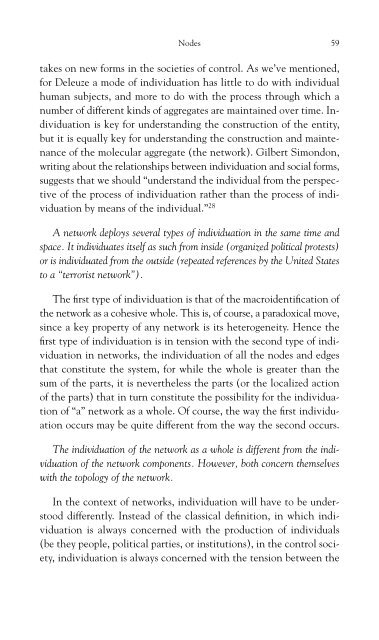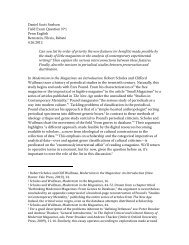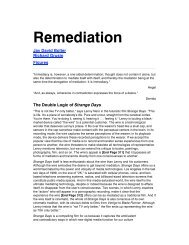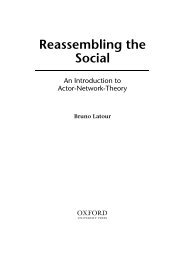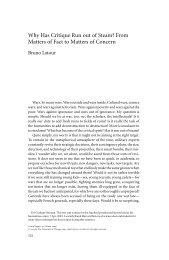The Exploit: A Theory of Networks - asounder
The Exploit: A Theory of Networks - asounder
The Exploit: A Theory of Networks - asounder
You also want an ePaper? Increase the reach of your titles
YUMPU automatically turns print PDFs into web optimized ePapers that Google loves.
Nodes 59<br />
takes on new forms in the societies <strong>of</strong> control. As we’ve mentioned,<br />
for Deleuze a mode <strong>of</strong> individuation has little to do with individual<br />
human subjects, and more to do with the process through which a<br />
number <strong>of</strong> different kinds <strong>of</strong> aggregates are maintained over time. Individuation<br />
is key for understanding the construction <strong>of</strong> the entity,<br />
but it is equally key for understanding the construction and maintenance<br />
<strong>of</strong> the molecular aggregate (the network). Gilbert Simondon,<br />
writing about the relationships between individuation and social forms,<br />
suggests that we should “understand the individual from the perspective<br />
<strong>of</strong> the process <strong>of</strong> individuation rather than the process <strong>of</strong> individuation<br />
by means <strong>of</strong> the individual.” 28<br />
A network deploys several types <strong>of</strong> individuation in the same time and<br />
space. It individuates itself as such from inside (organized political protests)<br />
or is individuated from the outside (repeated references by the United States<br />
to a “terrorist network”).<br />
<strong>The</strong> first type <strong>of</strong> individuation is that <strong>of</strong> the macroidentification <strong>of</strong><br />
the network as a cohesive whole. This is, <strong>of</strong> course, a paradoxical move,<br />
since a key property <strong>of</strong> any network is its heterogeneity. Hence the<br />
first type <strong>of</strong> individuation is in tension with the second type <strong>of</strong> individuation<br />
in networks, the individuation <strong>of</strong> all the nodes and edges<br />
that constitute the system, for while the whole is greater than the<br />
sum <strong>of</strong> the parts, it is nevertheless the parts (or the localized action<br />
<strong>of</strong> the parts) that in turn constitute the possibility for the individuation<br />
<strong>of</strong> “a” network as a whole. Of course, the way the first individuation<br />
occurs may be quite different from the way the second occurs.<br />
<strong>The</strong> individuation <strong>of</strong> the network as a whole is different from the individuation<br />
<strong>of</strong> the network components. However, both concern themselves<br />
with the topology <strong>of</strong> the network.<br />
In the context <strong>of</strong> networks, individuation will have to be understood<br />
differently. Instead <strong>of</strong> the classical definition, in which indi -<br />
viduation is always concerned with the production <strong>of</strong> individuals<br />
(be they people, political parties, or institutions), in the control society,<br />
individuation is always concerned with the tension between the


